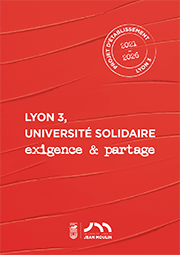AccueilRechercheProgrammes et productions scientifiquesThèsesThèses soutenuesThèses soutenues - 2024
-
Partager cette page
- Recherche,
- Philosophie,
HIRSINGER Mathilde
Radicalisation et droit pénal
Thèse en Droit, soutenue le 18/10/2024.
Si la radicalisation est une notion initialement psycho-sociologique, elle a désormais imprégné le lexique sécuritaire. Les attentats terroristes ayant touché les États-Unis d’Amérique le 11 septembre 2001, et ceux ayant frappé l’Europe en 2004 et 2005, ont entraîné une démocratisation du terme. La radicalisation désigne alors, dans le sens commun, le processus qui mène à l’acte terroriste. L’attrait opérationnel d’une telle notion se dévoile : identifier les étapes précédant un passage à l’acte dans le but d’éviter sa réalisation. L’objectif devient davantage préventif que répressif. Or, l’action du droit pénal sur ce phénomène n’a rien d’évident. Ce droit à l’essence répressive entend, classiquement, s’emparer des seuls actes ayant porté une atteinte effective à une valeur sociale, sans se préoccuper des comportements préalables n’ayant pas encore troublé la paix publique. Pourtant, radicalisation et droit pénal ne constituent pas deux entités aux frontières étanches. En proposant une définition générale, mais également une définition juridique de la radicalisation, la présente thèse s’attache à analyser la façon dont le droit pénal incrimine et punit le phénomène. L’analyse ainsi menée fait apparaître l’existence d’une véritable confusion des genres entre répression et prévention, sous le spectre d’une redistribution des rôles entre police administrative et police judiciaire.
Mots-clés : Radicalisation ; Droit pénal ; Terrorisme ; Idéologie ; Infraction politique ; Islamisme ; Militantisme ; Liberté d’expression ; Mobile ; Prévention ; Déradicalisation ; Prosélytisme ; Services de renseignement
Although radicalization was originally a psycho-sociological concept, it has now become an integral part of the security lexicon. The terrorist attacks in the United States on September 11, 2001, and in Europe in 2004 and 2005, have democratized the term. Radicalization is now commonly understood as the process that leads to a terrorist act. The operational appeal of such a notion is revealed: to identify the stages preceding an act of terrorism, with the aim of avoiding its occurrence. The aim becomes more preventive than repressive. Yet, the action of criminal law on this phenomenon is not obvious. Traditionally, the repressive nature of criminal law means that it only deals with acts that have effectively undermined a social value, without taking into account behaviour that has not yet disturbed the public peace. However, radicalization and criminal law are not two entities with watertight boundaries. By proposing a general definition, but also a legal definition of radicalization, this thesis aims to analyze the way in which criminal law incriminates and punishes the phenomenon. This analysis reveals the existence of a veritable confusion between repression and prevention, under the spectre of a redistribution of roles between administrative police and judicial police.
Keywords: Radicalization ; Criminal law ; Terrorism ; Ideology ; Political offence ; Islamism ; Activism ; Freedom of expression ; Motive ; Prevention ; Deradicalization ; Proselytism ; Intelligence services
Directrice de thèse : Anne-Sophie CHAVENT-LECLERE
Membres du jury :
- Mme CHAVENT-LECLERE Anne-Sophie , Maîtresse de conférences habilitée à diriger des recherches, Université Jean Moulin Lyon 3, Directrice de thèse
- Mme ALIX Julie , Professeure des universités, Université Paris Nanterre, Rapporteure
- M. CAHN Olivier, Professeur des universités, CY Cergy Paris Université, Rapporteur
- Mme SAFI Farah, Professeure des universités, Université Clermont Auvergne, Examinatrice
- M. PIN Xavier , Professeur des universités, Université Jean Moulin Lyon 3, Examinateur
Président du jury : Xavier PIN







